The Royal Visit
By Barry Egan
Monday July 25 2011
Barry Egan meets rock, pop and funk legend Prince and discovers that he's actually a bit of a laugh. They talk Bono, Barry's Tea and Sinead O'Connor, and Prince tries to fix up Barry up with one of his backing band
'I just got out of bed," Prince says, breezing nonchalantly into the suite. It's 5.15pm. He doesn't look like he has just got out of bed. He looks like he just descended from rock-star heaven. There isn't a hair out of place, or a crease that isn't meant to be there on his pants, as he makes his grand entrance onto the fifth floor of the Bristol Hotel on rue du Faubourg Saint-Honore in Paris. The 53-year-old looks immaculate, like an elegant, groomed Jimi Hendrix, who has pretty much defied the aging process.
And tres petit with it.
He is a tiny, almost cherubic figure, albeit with an impish grin. He asks me where the toilet is. I open the door for him. (I am sitting on an ancient table next to the plush toilet as His Highness in Heels arrives out of the blue). Upon completion, presumably, of his royal business, he high-fives me with freshly washed fingers, the same fingers that wrote all those timeless songs.
Apart from the gold-tinted pimp glasses and a gold chain, Prince is a vision in all black: tight, black toreador pants; a top that can only be described as a black blouse; black suede boots with heels that appear to make him, all 5ft 2in of him, float in the air as if a supernatural and superfunky being. He is flanked, not uncharacteristically, by three beautiful women, all singers in his red-hot band: Shelby Johnson, Liv Warfield and singer/guitarist Andy Allo.
"I never wear jeans," Prince says as he eyes mine. He taps my brown Prada boots with his own kinky-heeled boots.
"Jeans with holes in them used to be more expensive," says Andy.
Prince rarely talks to the press. He is elusive as smoke. Touch it and it is gone. Similarly, I'm gently told, ask Prince any indelicate questions about his personal life and he is gone.
Before we start, he tells me he "can't wait to play the castle in Malahide" -- referring to John Reynolds's soon to be sold-out concert of His Purpleness next Saturday.
I give him a box set of old jazz CDs (Miles Davis, John Coltrane) as a present. He peruses them, thanking me warmly, genuinely, for the gift. I should really thank him for the music he's given us. Prince has long since become a legend in his own lifetime with the songs that we love and continue to murder at family parties: 1999, Purple Rain, Let's Go Crazy, When Doves Cry, Little Red Corvette, U Got The Look, Raspberry Beret, Kiss (who hasn't sung, "You don't have to watch 'Dynasty' to have an attitude"?)
He sits down on the couch -- in the middle, intriguingly, of his three hot black singers. I take a chair. As the record industry crumbles, Prince seems to have stayed strong because his music was built to last.
I ask him if he thinks it's ironic what has happened to the music industry since he took his "slave" stance about his record deal with Warners in 1994. Becoming the Artist Formerly Known as Prince, he effectively went on strike. After a long struggle, he eventually regained control of the publishing rights to his work, helping to change the existing system with his then revolutionary actions.
"There's no point in looking back," he says, giving me eye contact. In fact, Prince looks at you a lot while talking to you. He is a genuinely friendly guy.
But you were telling the industry in 1993 that it was a doomed racket and you wanted out. That was 18 years ago. The industry said you were mad. The record industry is now effectively dead.
Of the big record labels, he says: "There have been lessons learned, that's for sure. I like what Morrissey said about how, isn't it funny how all their acts go to number one? They go on the cover of Rolling Stone after one release. It took me four albums. The record companies, they have become like carjackers."
Bono said you were too clever to be a slave.
He smiles again, this time, even majestically, if such a thing were possible. "Bono is a friend. But this is 2011."
In 1977, at the age of 19, Prince signed a three-album deal. He also got complete artistic control of the records, unheard of for a young kid, whereby he produced his own records and played all the instruments. "I didn't want my music to sound like anything else," he says. "Only I knew what I wanted."
It is incredible that a teenager would be given complete control by a record company. You obviously had huge self-belief. What were you like back then? A prodigy?
"Do you want a free autobiography?" he jokes. "I was all about the music. I am always all about the music."
What was it like back then?
"It was smaller. There was music coming out of everywhere, coming out of the ghetto."
Artists like Marvin Gaye and Sly Stone destroyed their creativity through excess, I say. Did you make a conscious decision over the years to protect your creativity? "My music is my muse. There is no point in talking about the personal with those people. What matters is they made great music. It's all to do with music."
How have you stayed ahead of the game?
"I don't see it as a race," he says. "It is not a race."
But you have been ahead of the game. (On 1987's masterpiece Sign o' the Times, Prince sang: "In France, a skinny man died of a big disease with a little name/By chance his girlfriend came across a needle and soon she did the same.") You were singing about Aids years before anyone else.
"This is 2011. Can we talk about 2011?"
I ask him what he'd like me to ask him about. "Music," he smiles, demurely.
Lady Gaga says you are a major influence on her new album.
He raises an eyebrow, almost coquettishly. "I don't talk about other artists."
What did you think of Beyonce's performance headlining Glastonbury?
"I thought it was a good show," he answers, adding; "She's a business now."
Are you headlining Glastonbury next year? His beautiful manager Kiran Sharma gives me a look -- let's not go there.
I ask Prince instead does he ever miss his anonymity. "It is so long ago that I had my anonymity -- they get to go shopping," he says, pointing to the girls on the sofa beside him. "So I guess I miss out on shopping."
How do you feel when people treat you like you are not human, some sort of deity?
"That is nothing to do with me. That says more about them than it does about me. Sometimes people can be scared to talk to me. That can sometimes work in my favour and be a good thing."
Did he make a decision to mix up the gender roles -- wearing bikini bottoms and fishnet stockings on stage, singing If I Was Your Girlfriend? He raises his eyebrow coquettishly and smiles. He doesn't, of course, answer.
Talking to Prince is so surreal, so random, that, after a while, the randomness of it becomes almost Zen-like and you just feel you can ask him anything and he will give you a Wildean riposte. Questions and answers become camp badinage. Like, for instance, when I asked him if he watched the movie Black Swan.
"That must have passed me by. It's not my cup of tea."
What is?
"English Breakfast Tea. Do they have Irish Breakfast Tea?"
They have Barry's Tea.
"Your tea? You have a tea? Would you like a tea?" he says getting up to make himself a cup of tea. He returns with a Diet Coke for me, as requested. He is nothing if not accommodating, His Purpleness. It is a very enjoyable way to spend a late afternoon: two hours in a suite in Paris shooting the breeze with Prince and his beautiful singers and his beautiful manager Kiran.
He is witty. "People are always asking me what I think of Sinead O'Connor's song Nothing Compares 2 U," he laughs (the joke is: he wrote it). He is humourous and clearly has a skill for comedy; he takes off my accent -- he makes me sound more London. He talks about the night when "I looked up and saw my mother onstage beside me. I
looked again and it was Cyndi Lauper."
I'm more confused. Your mother was onstage with Cyndi Lauper and you?
"No, it was Cyndi Lauper. She came on the road with us."
Prince takes a photo of me with his camera. "Do you want to see it?" He gets up and shows it to me.
"I like it, you look cool . . . you are talking with your hands," says Andy.
"When are you two getting married?" laughs Prince.
I tell Andy that she has surreally sexy, standy-uppy hair just like Sideshow Bob in The Simpsons.
"Thank you, future hubby," she replies. "I like your hair too."
"Who are The Simpsons?" Prince asks.
A cartoon programme with Bart and Homer and Marge.
"We're talking about cartoons here," Prince laughs. "She's great," he says of Andy. "Soon I'll be backing her up!" he whoops. "There is no reason why her record shouldn't sell 20 million copies. How many people on Facebook?"
I ask him how he knows when a song is finally finished. He says it isn't really. I ask him what instruments work well together. "Violin and accordions."
What about bagpipes?
A bursting-with-laughter Andy chips in with: "A bagpipe would be good."
A bursting-with-laughter Prince retorts with: "Some."
Andy: "Some?"
Prince: "Girl, it's some bagpipes! Not a bagpipe!" I guess you had to be there, but being around Prince and witnessing the riddle wrapped inside the mystery that is Prince is as fascinating as it is entertaining. He is nothing like I had expected; and everything like I expected. And more.
"Maybe I'm just like my father, too bold," he sang with no little emotion on When Doves Cry. "Maybe I'm just like my mother, she's never satisfied." He found redemption in music.
"I used to tease a lot of journalists early on," he said in a very rare interview in 1985, "because I wanted them to concentrate on the music and not so much on me coming from a broken home. I really didn't think that was important. What was important was what came out of my system that particular day. I don't live in the past."
"The early facts, for the neo-Freudians," wrote Neil Karlen in Rolling Stone in 1985, "John Nelson, leader of the Prince Rogers jazz trio, knew Mattie Shaw from North Side community dances. A singer 16 years John's junior, Mattie bore traces of Billie Holiday in her pipes and more than a trace of Indian and Caucasian in her blood. She joined the Prince Rogers trio, sang for a few years around town, married John Nelson and dropped out of the group. The two had a son and named him after John's stage name. Mattie and John broke up 10 years later, and Prince began his domestic shuttle."
There is a story, possibly apocryphal, that when Prince was younger, he used to stand outside the McDonald's on Plymouth Avenue in his hometown of Minneapolis and just smell the food because he didn't have any money to eat. When Martin Luther King got shot, it was Plymouth Avenue that burned.
Prince is an enigma full of Garboesque mystique. When he isn't onstage, he has a Howard Hughes-like penchant for self-seclusion. We know very little about him. We know he is divorced from his second wife, Manuela Testolini Nelson -- he alludes to "personal issues", but leaves it at that. Raised as a Seventh-day Adventist, Prince is now a convert to the Jehovah's Witnesses. Hence he no longer curses in songs or sings such godforsaken numbers as Sexy Mother ****er, Darling Nikki (I met her in a hotel lobby/Masturbating with a magazine) or, bless us and save us, Head:
U said but I'm just a virgin
And I'm on my way 2 be wed
But U're such a hunk
So full of spunk
I'll give you head
This will come as a relief to the Parents Music Resource Center (PMRC). In 1984, Tipper Gore was so shocked when she heard her daughter Karenna listening to Darling Nikki that she founded the PMRC.
"It is a family show," Prince says. "I had a 10-year-old girl at the front of the stage the other night and she was just loving the music, being in the moment of it all."
He isn't effete at all. He has quite a masculine aura. He talks about the synergy between him and the singers as being like a great basketball team on a play. There are stories of Prince playing basketball with Eddie Murphy back in the day.
When I mention later that James Brown famously used to fine his musicians if they missed notes, he laughs and says: "So what! You shouldn't have to pay a basketball player if he misses shots."
Do you ever miss notes?
"Sometimes."
Do you fine yourself?
"Maybe I'll have to start!" he laughs.
I'm still getting my head round the fact that Prince loves sports. I thought it would be more a night in listening to soul albums while reading the Bible. Do you like football?
"I like American football. Oh, you mean soccer," he hoots. "I'm getting into soccer. I watched the World Cup."
It is strictly off limits to use sound-recording devices when talking to Prince -- I even had to leave my mobile phone outside -- so I am furiously scribbling on bits of paper as he and the girls talk.
"I rarely go to shows at all," he says. "I saw Bruce Springsteen. He was brilliant. He is one of the acts who doesn't phone it in. Usually when I go to shows, I take half of the crowd with me to the parking lot when I leave. That didn't happen with Bruce. He has something special."
Prince adds that he has had some big names join him onstage over the years and he has had to "turn off their microphones and politely get them off stage. They can't do it. I have great musicians and singers -- like these girls -- around me onstage. It is like telepathy.
"That was one thing about Michael Jackson. He was one of the greatest performers but he never had a great band around him. Miles Davis had a great band around him. I have the same thing going on with my band. Playing with this band brings me great joy".
How do you maintain the desire to do this for three decades?
"It's a hunger but not like with food. A hunger in my music. My music has a feel."
You have been doing this for 30 years. They say that familiarity breeds contempt. But it never happened with you, why?
"Because we never play the same set of songs the same way," he explains. "We have 400 or 500 songs we can call on every night. We don't have a set. We have a loose outline, a loose sketch, of what we are going to do. Stevie Wonder once told me he was like a DJ. He has a great feel for what the audience wants to hear. I think we have that too. It is a joy. The people feel so good at the shows, we feel so good."
Do you have an iPod?
"God, no, my ears!"
What's the biggest misconception about you?
"That I get tired of playing the old songs. They're my songs. I like playing them.
Is there any song you wish you had written?
"People Pleaser. Also Nothing Compares 2 U," he jokes
What's your favourite cover of your work?
"That's a great word. Cover. Where does that word come from?"
Do you like Van Morrison? "I liked one of his songs I heard when I was younger. It had guitars in it. It was in a band?"
On Van's I Forgot That Love Existed, he sings: "If my heart could do my thinking and my head begin to feel/I would look upon the world anew and know what's truly real."
"Really? That sounds interesting."
Have you read any Irish poetry? Yeats? Oscar Wilde?
"There is still time."
But there isn't. My two hours with the greatest living genius of the past three decades, with the exception of Bob Dylan, is up. He has to places to go and people to meet in the City of Light. He has a home in Paris (as well as Minneapolis.)
His charisma and his creativity are undiminished through those decades. Leaving for his French Xanadu, Prince says he will see me in Dublin. "I am going to give something special to Ireland at that show," he assures me.
Later that night in Paris, Prince plays a triumphant gig to 50,000 ecstatic fans in the Stade de France in Paris and 35,000 at the Hop Farm in Kent a few nights later, which I attend.
"I'm looking forward to playing Dublin," the reigning king of pop says, as he makes his grand exit, with security and manager and girl singers, photographers, promoters, and me, hurrying out after him into the balmy Paris early evening night.
"I'll play for eight hours straight in Dublin," Prince says, "if they don't have a curfew."
Prince plays Malahide Castle on July 30. Tickets are still on sale. See www.pod.ie - Barry Egan
Originally published in
 Source
Source

 New topic
New topic Printable
Printable moderator
moderator

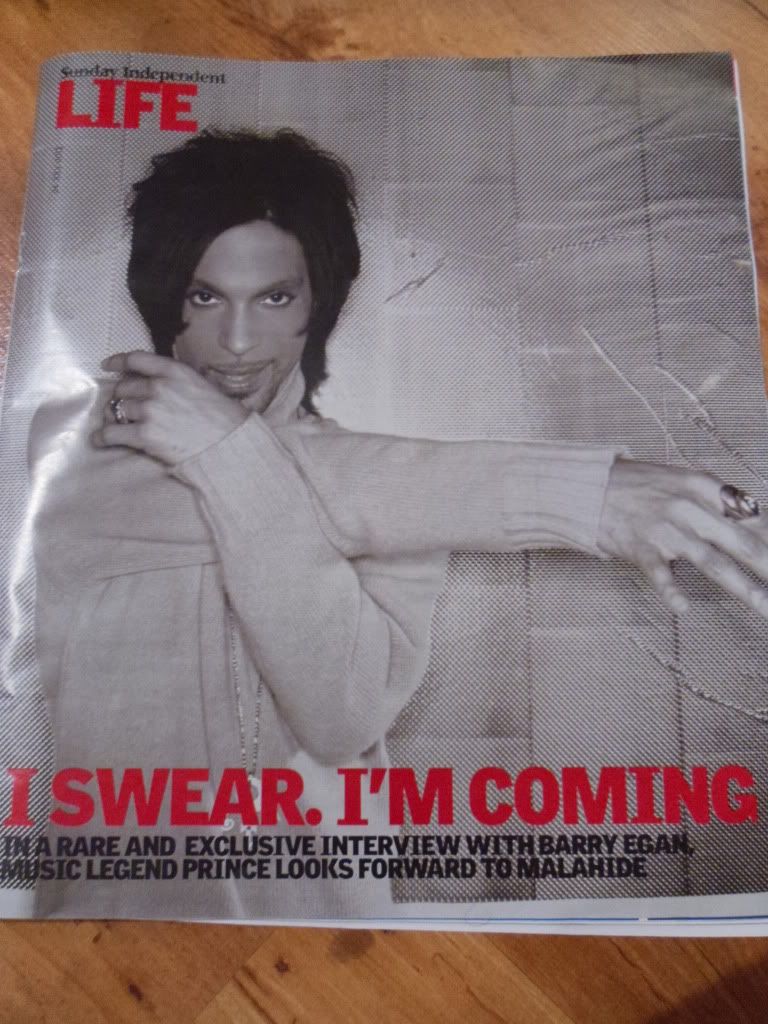
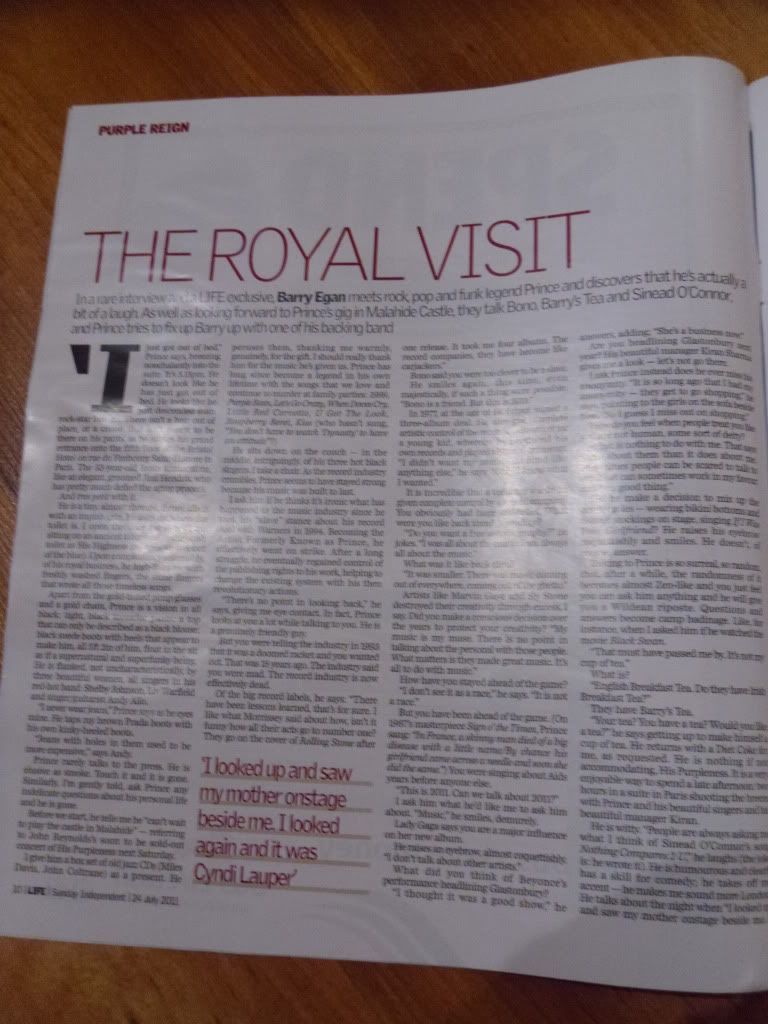
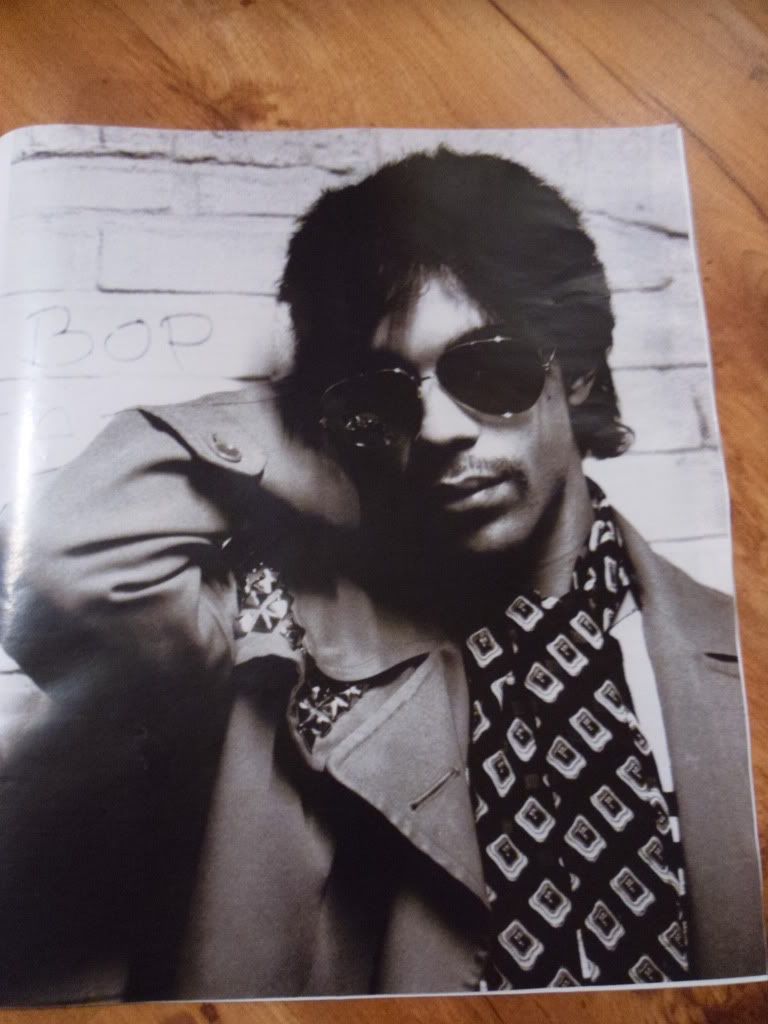
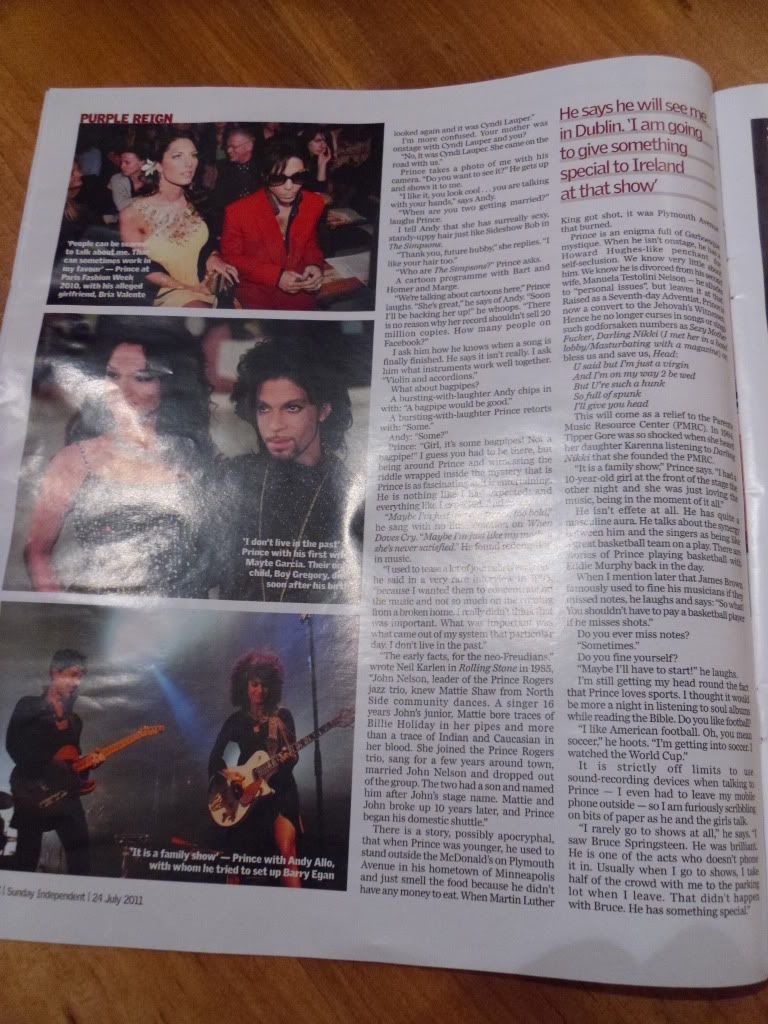
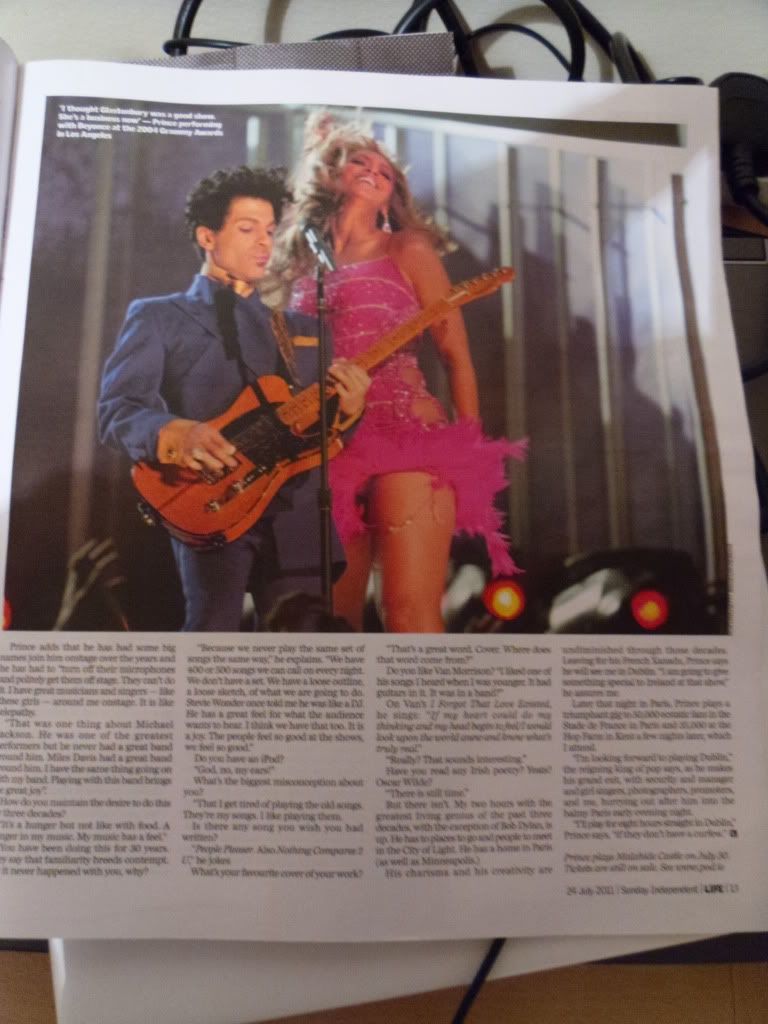
 Report post to moderator
Report post to moderator
 will ALWAYS think of
will ALWAYS think of  like a "ACT OF GOD"! N another realm.
like a "ACT OF GOD"! N another realm.